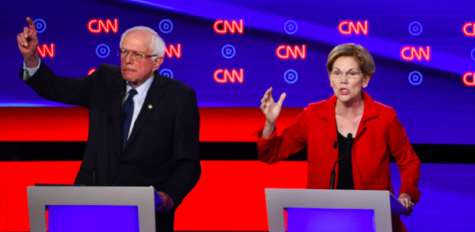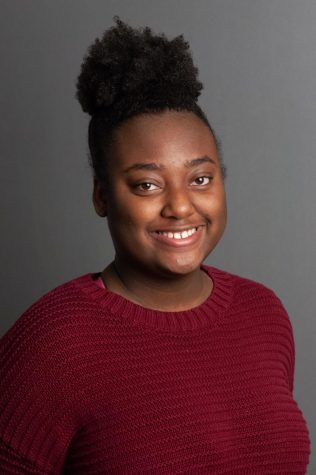Fourteen democratic candidates debate major topics
November 26, 2019

As election day approaches, the number of democratic nominees has been steadily decreasing. In the beginning of the race, there was a total of 26 candidates. By the first major debate of the year in June, the numbers lowered to 20. Due to the Democratic National Committee’s (DNC) polling and fundraising criteria, ten more people did not qualify for the Sept. and Oct. debate. Even though the process has sifted through 16 people, this election set the record for the largest pool of democratic candidates.
The stage consisted of 12 people: Former Vice President Joe Biden, New Jersey Sen. Cory Booker, South Bend, IN, Mayor Pete Buttigieg, former Housing and Urban Development Secretary Julián Castro, California Sen. Kamala Harris, Minnesota Sen. Amy Klobuchar, former Texas Rep. Beto O’Rourke, Vermont Sen. Bernie Sanders, Massachusetts Sen. Elizabeth Warren, and entrepreneur Andrew Yang.
The latest debate in October held at Otterbein University in Westerville, Oh., and kicked off asking candidates about Trump’s impeachment inquiry. Many of them had similar view. That it is a top priority to impeach him. Others, such as Entrepreneur Andrew Yang, supported the impeachment, but felt that it is not America’s largest problem.
“When we are talking about him, we are losing. We need to present a new vision and that even includes impeaching Donald Trump,” Yang said.
In the previous debate that took place in September, Yang made headlines as he promised a freedom dividend of $1,000 a month to ten families for a year. Many other candidates were taken back by this. This idea was soon turned down on a federal level because he would essentially be buying voters.
Some candidates, like Vermont Sen. Sanders, used their time throughout the debates to advocate for things like universal health care and raising the minimum wage. He started off strong as he branded President Trump the most dangerous American President in history. He continued to say that America is turning into an oligarchy, and if he was elected president, he would reverse that.
Health care was the most talked about topic across all three debates by a long run, with a totalling 93 minutes. Massachusetts Sen. Warren was another candidate that was in strong favor of universal health care. Her plan is to make it so that every American is ensured by a government provided health care service. When asked how she was going to pay for this, she made it clear that the taxes of wealthy Americans and large corporations will significantly go up.
Many others challenged this plan. South Bend, IN, Mayor Buttigieg had the most to say back to Warren. He said that she still has not provided a thorough enough plan to pay for the multi-trillion dollars that would be required. He went on to propose “Health care for all who want it.”It will give Americans the choice of whether they want the healthcare the government is providing. If they do not, they will stay on their private company. Buttigieg says that it is not fair to take private plans away from 150 million Americans.
The healthcare discussion continued as Sanders asserted that he was the one who originally wrote the bill. In the bill that he drafted there will be no premiums, copayments, deductibles or out of pocket expenses.
Former Vice President Joe Biden fired back and said that both Warren’s and Sanders’ plans will cost about $30 trillion over ten years. He says for people making between $50-$75,000 annually, their taxes are going to be raised about $5,000.
Sanders made more big promises when asked if he would be able to provide a job to every American that fell victim to automation. He proposed a federal job guarantee. Sanders says he can put 15 million people to work by building roads, bridges, water systems, wastewater plants, airports etc. He went on to say that his new deal that combats climate change will provide 20 million jobs.
When the moderators switched the topic to gun violence, the candidates’ opinions were very split between mandatory and voluntary gun buybacks. Former Texas Rep. O’Rourke, who grew up in El Paso where a mass shooting took place in early Aug., supported mandatory buybacks.
“When we see that being used against children…Hell yes, we’re going to take your AR-15, your AK-47. We’re not going to allow it to be used against our fellow Americans anymore,” said O’Rourke.
Others called out for his biased opinion. Mayor Buttigieg and New Jersey Sen. Booker reminded him that gun violence is also linked to suicide and community violence as well.
Booker continued to mention how gun violence affects schools. He said that we are surrendering out freedoms to fear.
“This is the first time in American history, this fall, that we have sent our children to school… and said to them, ‘We can’t protect you, so instead, we’re going to teach you how to hide,” said Booker.
Warren had opposing views. She was on the side of voluntary gun buybacks. She says that she wants to do whatever works. As an example, she mentioned the voluntary buyback of machine guns. Her plan is to have owners register them and fine those who do not, then place a large tax on the assault weapons. She felt this plan would force owners to turn in their weapons in the long run.
The opioid crisis was another major topic that was covered. There were some candidates that had a unique take on the subject, such as Yang and O’Rourke. They proposed decriminalizing small amounts of opiods that were for personal use.
As the countdown to the last debate in Nov. decreases, the more certain candidates become larger targets. In the beginning of the race, Sanders, Biden and Warren were the biggest threats.
Even though she is not leading in the polls, Elizibeth Warren is currently the biggest target out of democratic party.

